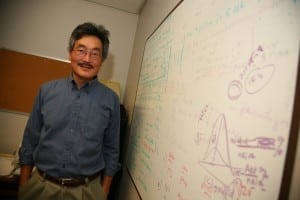 Shiu-Lok Hu’s work began decades ago in utter frustration with a powerful and unknown virus and continues today…with promising new leads and a novel approach to creating an HIV vaccine.
Shiu-Lok Hu’s work began decades ago in utter frustration with a powerful and unknown virus and continues today…with promising new leads and a novel approach to creating an HIV vaccine.
“I began this work 30 years ago and have seen the diagnosis of AIDS change from a certain death sentence to a manageable chronic condition. My dream is to see it disappear.”—Shiu-Lok Hu, Milo Gibaldi Endowed Professor of Pharmaceutics
Vaccines save lives. When the human immunodeficiency virus (HIV) was identified, there soon followed calls to create a vaccine. If we can have vaccines for influenza, mumps, measles and other viruses, it seems logical that we could have one for HIV as well.
But HIV presents a significant challenge to creating a vaccine. HIV is a highly lethal virus that continues to evolve in the body, making it difficult for the infected person to clear the infection. Without effective therapeutic intervention, there are few survivors after contracting HIV. “If you get mumps and recover from it, you develop a lifetime immunity,” explains Pharmaceutics Professor Shiu-Lok Hu. “This has been the paradigm for classical vaccine development: to mimic natural infection without causing the disease. But, to make a HIV vaccine, we may have to look for a new paradigm. HIV leaves few survivors. Unfortunately, HIV has evolved many mechanisms to evade the immune system and ultimately destroy it. Even today, with effective treatments, if you stop taking drugs, the virus comes back.”
About 30 years ago, Shiu-Lok had a breakthrough to create a prime-boost immunization to help the body fight the virus, similar to other vaccine protocols with booster shots. That breakthrough began decades of Shiu-Lok’s research funded by the National Institutes of Health and more recently by the Gates Foundation.
So far, the only vaccine that has shown a modest (~30%) efficacy is the one tested on >16,000 volunteers in Thailand (the Thai trial), that uses the “prime-boost” strategy. Although the Thai trial has shown the feasibility of vaccination against HIV, further improvements are needed to make it an effective preventive measure.
Shiu-Lok has joined forces with Associate Professor of Medicinal Chemistry Kelly Lee to continue the research to find a reliable vaccine and booster. They are using a genetically engineered smallpox vaccine to prime the immune system, followed by recombinant HIV proteins as a boost. In this new grant, Shiu-Lok and Kelly hope to improve the efficacy of the “prime-boost” approach by designing a more effective vaccine. Kelly has studied the influenza virus, which utilizes mechanisms similar to those used by HIV to “dock” onto the host cell, pry it open, transfer the viral genes into the cell, thereby taking it over and causing the infection.
The team seeks to create a vaccine that could better expose the part of HIV it uses to dock onto the cell, thus making it easier for the body to mount immune responses to block infection. If successful, these approaches are likely to result in greater efficacy than that achieved in the Thai trial.
This project highlights the unique capacity of the UW School of Pharmacy in pharmaceutical sciences, as Shiu-Lok and Kelly each bring different expertise in virology, immunology, and structural biochemistry to tackle problems such as HIV vaccine. Their partnership could well lead to a breakthrough to find a safe and efficacious vaccine to help make the world free of AIDS.
The five-year, $4.5M grant was funded by the National Institute of Allergy and Infectious Diseases, National Institutes of Health (R01AI129673).
To study with UWSOP’s top faculty in health economics and outcomes, medicinal chemistry, and pharmaceutics, click here for more information about our Graduate Programs in Medicinal Chemistry, Pharmaceutics, Pharmaceutical Outcomes Research and Policy, and Biomedical Regulatory Affairs.